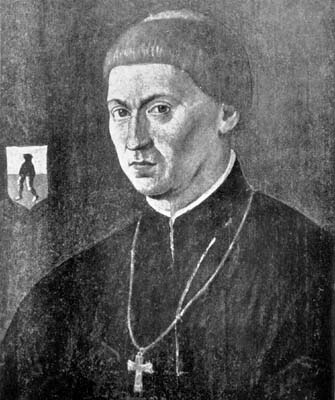On this date in 1447, Lucas Watzenrode was born. A nobleman from Weizenrodau in Poland, he studied theology at universities in Krakow, Cologne, and Bolona, became a priest and then bishop under Pope Innocent VIII, and in a political compromise between the King of Poland and the Pope, became Prince-Bishop of Warmia, an autonomous Bishop. Watzenrode had his hands full with diplomatic efforts between church and state in the Baltic region, not only in maintaining his authority over his church appointment against attempts of the secular authorities to limit it, but in his opposition to the old crusade order of the Teutonic Knights, who resented the Bishop’s new authority over what had been their feudal territory for centuries.
So Watzenrode is an interesting person in his own right. His diplomatic skills must have been considerable, since he was able to overcome court prejudice, and served as a trusted advisor for three successive Polish Kings. But I suspect that he would not be remembered and studied nearly so much if it hadn’t been for his willingness to accept responsibility for his family.
Despite his clerical and secular duties, when his sister Barbara and her husband died, Watzenrode took her four children into his own household to raise. Overseeing the education of the two sisters and sending the two brothers to study at Krakow, Bologna, Padua, and Ferrara to attend the courses and gain the experience needed to practice medicine. This young nephew became his uncle’s trusted advisor as well as personal physician, but in his free time, he also took advantage of the theories and ideas he’d heard at Padua while he studied medicine, pursuing a growing interest in mathematics and astronomy. Watzenrode died in 1512, and did not live to see his nephew’s success in these fields.
Only two years later, in 1514, young Nicolaus Copernicus published De hypothesibus motuum coelestium a se constitutis commentariolus, the first of his summaries of a new heliocentric theory of the planets.

